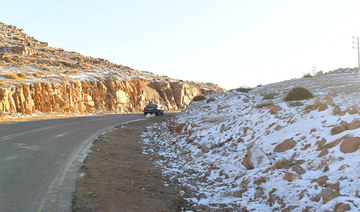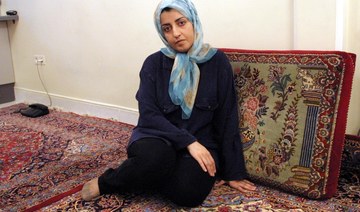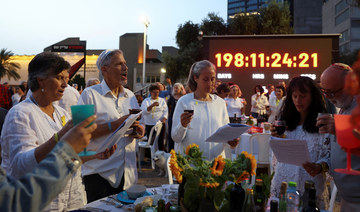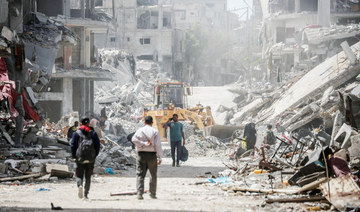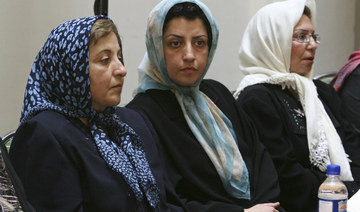BEIRUT: Snow blanketed parts of Syria, Lebanon, Jordan and Israel on Wednesday, covering areas it has not reached in years, disrupting traffic and postponing vaccination campaigns against COVID-19 and even exams at some universities.
It snowed for the first time in years in Marjayoun in southern Lebanon, and in Bayda in northeast Libya.
Gale force winds knocked out electricity in vast parts of Lebanon, forcing many Lebanese, already used to power cuts, to rely on generators for longer hours. Rescuers pulled four motorists out of their snow-covered cars, the National News Agency said.
The first snow this winter in the Syrian capital, Damascus, did not prevent the Premier League soccer tournament from going ahead, as Army Sports Club and Al-Karamah faced off despite the snow that covered the pitch, the Syrian Al-Watan daily reported .
In the mountains of Syria’s Sweida province, snow was as high as 15 cm (6 inches), according to the official state news agency SANA. Roads in some provinces were blocked. In the central province of Hama, bulldozers shoveled snow to open roads while vehicles skidded on ice, causing traffic disruption.
The University of Damascus called off mid-term exams scheduled for Wednesday and Thursday in all its branches around Syria because of the extreme weather conditions. The country’s ports remained open. Later, local authorities in the provinces of Sweida, Quneitra, Daraa and Tartous suspend school on Thursday due to the storm and heavy snowfall.
In the opposition-held northwestern Syria, civil defense teams have been building dirt mounds since Tuesday around camps for the displaced to prevent rain from flooding the crowded areas. Nearly 3 million displaced people live in northwestern Syria, mostly in tents and temporary shelters. Heavy rainfall last month damaged over 190 displacement sites, destroying and damaging over 10,000 tents.
In neighboring Lebanon, Storm Joyce hit late Tuesday with gale force winds registering between 85 km/h (52 miles/h) and 100 km/h (62 miles/h). The storm is expected to get stronger Thursday.
Breaking a warm spell, the storm brought heavy rainfall, a sharp drop in temperatures and the heaviest snow fall in Lebanon this year. Snow is expected to cover areas of altitudes as low as 400 meters, according to the meteorological department. Nearly a dozen roads in eastern and northern Lebanon were closed to traffic because of the snow. A beachside club and restaurant were submerged in water as waves nearly 4 meters (13 feet) high slammed onto the shore.
The Israeli Meteorological Service forecast heavy thunderstorms and cold temperatures across much of the country, with snowfall at higher altitudes expected later on Wednesday, including in Jerusalem. On Wednesday night, Israeli police closed the main road between Tel Aviv and Jerusalem due to snow.
Heavy snowfall covered the Israeli-annexed Golan Heights near the border with Syria.
In Jordan, the COVID-19 vaccination drive was suspended due to severe weather conditions. Schools and universities also put off classes. Jordan’s Prime Minister Bishr Al-Khasawneh announced that Thursday will be an official holiday for both the public and private sector due to the snow storm.
Osama Al-Tarifi, director of the operating room of the Arabia Weather site, said snow has reached 20 cm (8 inches) in the mountains of Ajloun in northern Jordan, where snowfall has been non-stop since Tuesday night. Heavy snow is expected in the capital, Amman, on Wednesday.
Wind exceeded 100 km/hour (62 miles/h) in some areas in Jordan.
In Libya, snow blanketed the country’s northeast mountains as snowfall continued since Tuesday, covering forests and roads in some areas in the North African country.
Residents of the Jabal Al-Akhdar area in the far northeast part of Libya took their children out for fun, some making snowmen and others starting snowball fights.
“I was surprised, actually, by the number of families who came here to take pictures to remember the snow,” said Ali Al-Shairi, an amateur photographer from the eastern city of Bayda, which is known for recurrent snow in Libya but has not seen any for a couple of years.
In neighboring Egypt, heavy rain and windy weather prevailed on Wednesday and was expected to last into Thursday, the country’s meteorological agency said. Authorities in South Sinai province, which includes touristic hubs, canceled touristic activities, including safaris and cruises to weather the storm.
Heavy snowfall, gales as winter storm hits Middle East
https://arab.news/pr6rn
Heavy snowfall, gales as winter storm hits Middle East
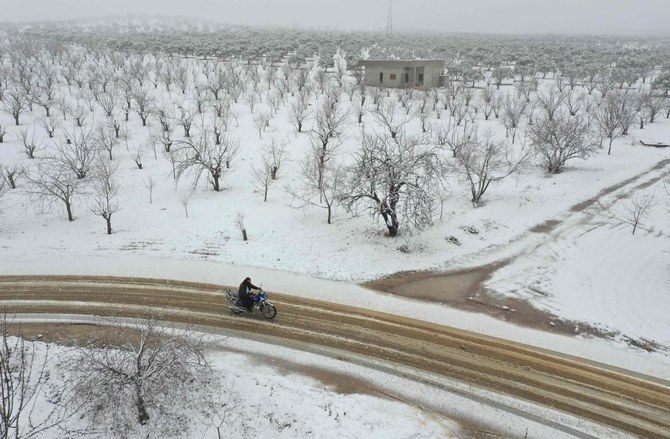
- It snowed for the first time in years in Marjayoun in southern Lebanon, and in Bayda in northeast Libya
Tent compound rises in Khan Younis as Israel prepares for Rafah offensive
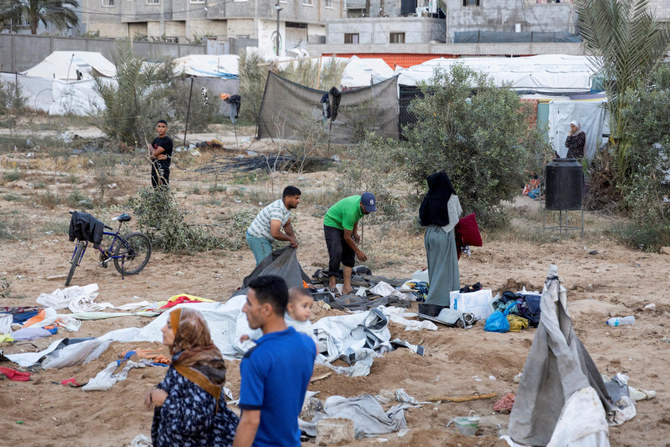
- Israel has said it plans to evacuate civilians from Rafah during an anticipated offensive on the southern city
- The Israel-Hamas war has killed more than 34,000 Palestinians
The tent construction is near Khan Younis, which has been targeted by repeated Israeli military operations over recent weeks. Israel has said it plans to evacuate civilians from Rafah during an anticipated offensive on the southern city, where hundreds of thousands of people have taken refuge during the war, now in its seventh month.
Also Monday, a failed rocket strike was launched at a base housing US-led coalition forces at Rumalyn, Syria, marking the first time since Feb. 4 that Iranian-backed militias have attacked a US facility in Iraq or Syria, a US defense official said. No personnel were injured in the attack, and no group has claimed responsibility for the attack.
The conflict has sparked regional unrest pitting Israel and the US against Iran and allied militant groups across the Middle East. Israel and Iran traded fire directly this month, raising fears of all-out war.
The war was sparked by the unprecedented Oct. 7 raid into southern Israel in which Hamas and other militants killed around 1,200 people, mostly civilians, and abducted around 250 hostages. Israel says militants are still holding around 100 hostages and the remains of more than 30 others.
The Israel-Hamas war has killed more than 34,000 Palestinians, according to local health officials, at least two-thirds of them children and women. It has devastated Gaza’s two largest cities and left a swath of destruction. Around 80 percent of the territory’s population have fled to other parts of the besieged coastal enclave.
The US House of Representatives approved a $26 billion aid package on Saturday that includes around $9 billion in humanitarian assistance for Gaza, which experts say is on the brink of famine, as well as billions for Israel. The US Senate could pass the package as soon as Tuesday, and President Joe Biden has promised to sign it immediately.
Iran’s foreign minister calls EU sanctions ‘regrettable’
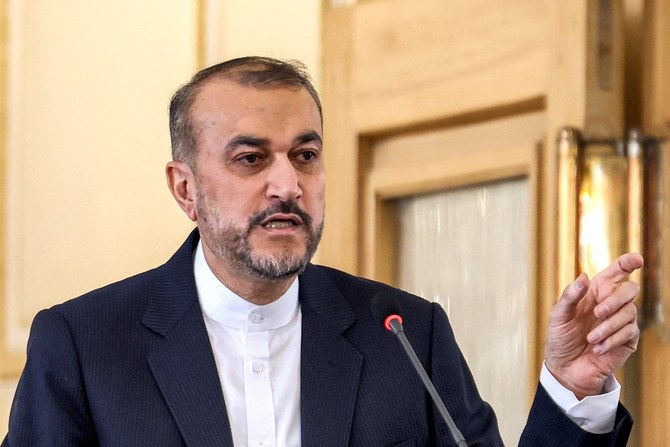
- EU foreign ministers agreed in principle to expand sanctions on Iran by agreeing to extend restrictive measures on Tehran’s weapons exports
DUBAI: European Union sanctions announced following Iran’s attack against Israel are “regrettable” because the country was acting in self-defense, Iran’s Foreign Minister Hossein Amirabdollahian posted on X on Tuesday.
Iran launched more than 300 drones and missiles on Israel in what it said was retaliation against a suspected Israeli bombing of its embassy compound in Damascus.
On Monday, EU foreign ministers agreed in principle to expand sanctions on Iran by agreeing to extend restrictive measures on Tehran’s weapons exports of any drone or missile to Iranian proxies and Russia.
“It is regrettable to see the EU deciding quickly to apply more unlawful restrictions against Iran just because Iran exercised its right to self-defense in the face of Israel’s reckless aggression,” Amirabdollahian said on X, before calling on the EU to apply sanctions on Israel instead.
More work will need to follow in Brussels to approve a legal framework before the expansion of the sanctions can take effect.
Israel’s Gaza war has negatively impacted human rights, says US report

- Rights issues include credible reports of unlawful killings, enforced disappearances and torture, says report
- Israeli military's conduct has come under scrutiny as its forces have killed over 34,000 in Gaza since Oct. 7
WASHINGTON: The war between Israel and Hamas that has killed tens of thousands of Palestinians in Gaza and resulted in a severe humanitarian crisis has had “a significant negative impact” on the human rights situation in the country, the US State Department said in its annual report on Monday.
Significant human rights issues include credible reports of arbitrary or unlawful killings, enforced disappearance, torture and unjustified arrests of journalists among others, said the State Department’s 2023 Country Reports on Human Rights Practices.
The report added that the Israeli government has taken some credible steps to identify and punish the officials who may have been involved in those abuses.
Israel’s military conduct has come under increasing scrutiny as its forces have killed 34,000 Palestinians in Gaza, according to the enclave’s health authorities, many of them civilians and children. The Israeli-occupied Gaza Strip has been reduced to a wasteland, and extreme food shortages have prompted fears of famine.
Israel launched its assault in response to a Hamas attack on Oct. 7, in which Israel says 1,200 people were killed.
Rights groups have flagged numerous incidents of civilian harm during the Israeli army’s offensive in Gaza, as well as raised alarm about rising violence in the Israeli-occupied West Bank, where Palestinian Health Ministry records show Israeli forces or settlers have killed at least 460 Palestinians since Oct. 7. But so far the Biden administration has said it has not found Israel in breach of international law.
Washington gives $3.8 billion in annual military assistance to its longtime ally. Leftist Democrats and Arab American groups have criticized the Biden administration’s steadfast support for Israel, which they say provides it with a sense of impunity.
But this month, President Joe Biden for the first time threatened to condition support for Israel, and insisted that it take concrete steps to protect humanitarian aid workers and civilians.
Israel’s Gaza war has negatively impacted human rights, says US report
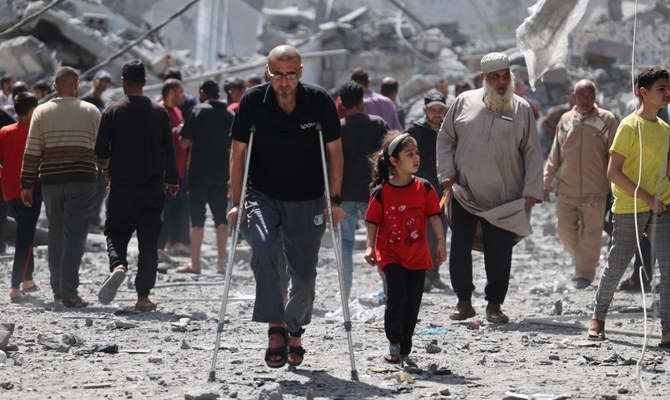
- The Israeli-occupied Gaza Strip has been reduced to a wasteland, and extreme food shortages have prompted fears of famine
WASHINGTON: The war between Israel and Hamas that has killed tens of thousands of Palestinians in Gaza and resulted in a severe humanitarian crisis has had “a significant negative impact” on the human rights situation in the country, the US State Department said in its annual report on Monday.
Significant human rights issues include credible reports of arbitrary or unlawful killings, enforced disappearance, torture and unjustified arrests of journalists among others, said the State Department’s 2023 Country Reports on Human Rights Practices.
The report added that the Israeli government has taken some credible steps to identify and punish the officials who may have been involved in those abuses.
Israel’s military conduct has come under increasing scrutiny as its forces have killed 34,000 Palestinians in Gaza, according to the enclave’s health authorities, many of them civilians and children. The Israeli-occupied Gaza Strip has been reduced to a wasteland, and extreme food shortages have prompted fears of famine.
Israel launched its assault in response to a Hamas attack on Oct. 7, in which Israel says 1,200 people were killed.
Rights groups have flagged numerous incidents of civilian harm during the Israeli army’s offensive in Gaza, as well as raised alarm about rising violence in the Israeli-occupied West Bank, where Palestinian Health Ministry records show Israeli forces or settlers have killed at least 460 Palestinians since Oct. 7. But so far the Biden administration has said it has not found Israel in breach of international law.
Washington gives $3.8 billion in annual military assistance to its longtime ally. Leftist Democrats and Arab American groups have criticized the Biden administration’s steadfast support for Israel, which they say provides it with a sense of impunity.
But this month, President Joe Biden for the first time threatened to condition support for Israel, and insisted that it take concrete steps to protect humanitarian aid workers and civilians.
Nobel laureate urges protest against Iran’s ‘war on women’
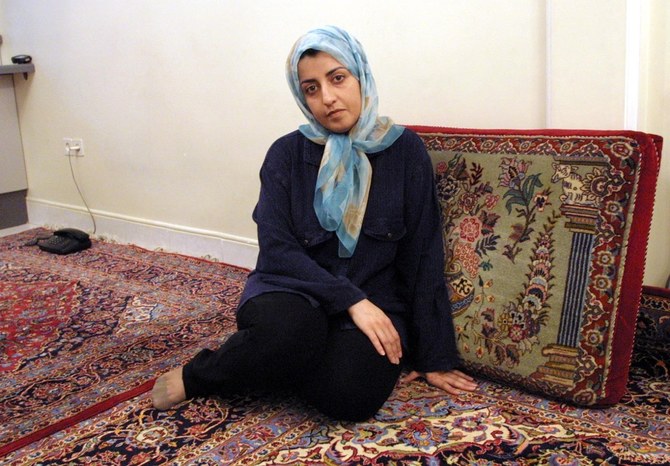
- Narges Mohammadi issues plea from Evin prison amid new crackdown by Tehran’s morality police
JEDDAH: Jailed Iranian Nobel laureate Narges Mohammadi urged Iranians on Monday to protest against the clerical regime’s “war against women” amid a new crackdown forcing women to cover their heads.
Mohammadi, who is being held in Evin prison in Tehran, called on Iranian women to share their stories of arrest and sexual assault at the hands of the authorities.
Iran launched a nationwide operation this month to enforce the wearing of the headscarf. Women have been arrested and taken to police stations by the morality police, and the Farsi hashtag meaning “war against women” has been trending on social media.
“People of Iran, I ask you, artists, intellectuals, workers, teachers, and students ... inside and outside the country to protest against this war against women,” Mohammadi said in a message from inside the prison. “Do not underestimate the power of sharing your experiences. Doing so will expose the misogynistic government and bring it to its knees.” She accused the authorities of bringing “a full-scale war against all women to every street in Iran.”
Mohammadi said she had been joined in jail by Dina Ghalibaf, a journalist and student who was arrested after accusing security forces on social media of putting her in handcuffs and sexually assaulting her during a previous arrest at a metro station. “For years, we have witnessed many women who have endured assault, abuse, and beatings by government agents,” Mohammadi said.
Mohammadi, 52, was awarded the Nobel Peace Prize last year in recognition of her campaign for human rights in Iran, which has led to her spending much of the past two decades in and out of jail. She has been imprisoned since November 2021 and has not seen her husband and twin children, who live in Paris, for several years.











